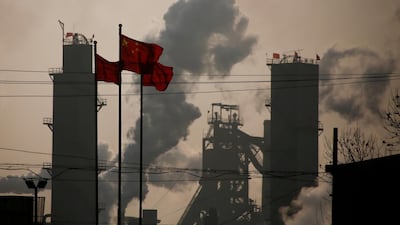Earnings at China's industrial firms shrank for a second straight month in December, putting pressure on policymakers to support industries hurt by slowing prices and weak factory activity amid a protracted US-Sino trade war.
The downbeat data points to more troubles ahead for the country's vast manufacturing sector already struggling with a decline in orders, job layoffs and factory closures as China's economic growth slows to its weakest in nearly three decades.
China's economy expanded 6.6 per cent in 2018 and growth is set to slow further this year as Beijing's efforts to reduce debt risks depress the property market and curb credit flows to the private sector, while a crackdown on pollution dents industrial activity.
Industrial profits in December fell 1.9 per cent from a year earlier to 680.8 billion yuan (Dh370.55bn), weighed down by weak factory-gate prices and soft demand, the National Bureau of Statistics (NBS) said on Monday. This is on top of a decline of 1.8 per cent in November - the first contraction in profits in nearly three years.
"As far as the future trend is concerned, it is quite obvious that it will continue to decline because the [producer price index] has apparently turned negative last month, and when PPI has turned negative, the profits of industrial enterprises will go down," said Tang Jianwei, senior economist at Bank of Communications in Shanghai, adding that the structure of corporate profitability will also start to change.
"Profits at mid and downstream sectors may stabilise while the upstream sector will face immense pressure."
Profits at chemical, coal mining and non-ferrous metal sectors all slowed significantly in December, the data showed.
For the full year, profits rose 10.3 per cent to 6.64 trillion yuan in 2018, easing from 2017's robust pace of 21 per cent.
Upstream sectors such as oil extraction, coal and metal mining still commanded the lion's share of profit gains last year, but analysts say that as industrial prices slow further or even shrink, profitability will come under pressure, according to Reuters. Mr Tang said that if large-scale tax cuts promised by the government could be rolled out in time, however, it would help put a floor on declining industrial profits in the second half.
A survey from the state planner this month showed activity at 2,500 Chinese small and mid-sized enterprises continued to contract in the fourth quarter last year despite a flurry of supportive government policies.
The Small and Medium Enterprises Development Index stood at 93 last quarter, below the 100-mark that separates growth from contraction, according to the National Development and Reform Commission.
Moody's said in a recent report the Chinese government's latest measures to support funding for private firms would be limited in effect, as credit would mostly flow to the fewer stronger privately-owned enterprises.
Monday's data showed industrial firms' liabilities rose 5.2 per cent from a year earlier to 64.1tn yuan by end-2018, compared with a 5.8 per cent rise as of end-November.
_______________
Read more:
Smartphone shipments to China plunge 11%
Gloomy global growth outlook dampens Davos
_______________
Although traders are replenishing inventory ahead of the Lunar New Year holiday in early February, demand remains weak. Aggravating the slowdown, the government has also vowed it will not relent on enforcing anti-pollution controls, refusing to accept mounting economic pressure as excuses.
That raises uncertainty on the overall boost to the industrial sector from support measures policymakers have pledged so far.
Beijing has promised to increase spending on infrastructure projects this year and boost consumption in areas such as automobile and home appliances.
The state-run enterprise China Railway is planning a record-high rail investment worth about 850bn yuan in 2019, according to a Nikkei report.
China's producer prices rose at their slowest pace in more than two years in December. New orders - an indicator of future activity - contracted for the first time in at least a year in December.
Profits at China's state-owned industrial firms rose 12.6 per cent in 2018 from a year earlier, slowing from a 16.1 per cent increase in the January-November period.
Tensions between the US and China are about to get more complicated, with the World Trade Organisation poised to begin an investigation into President Donald Trump’s tariffs on $250bn of Chinese goods.
On Monday, the Geneva-based arbiter of trade disputes will likely launch an inquiry into whether the US duties run afoul of a requirement that all WTO members give each other the same tariff treatment, as China asserts.
The investigation comes at a delicate moment between the world’s two largest economies, Bloomberg said. A new round of trade talks is scheduled to begin on January 30, and if a deal isn’t reached by March 1, the Trump administration has threatened to raise the tariff rate on $200bn in Chinese goods to 25 per cent from 10 per cent.

